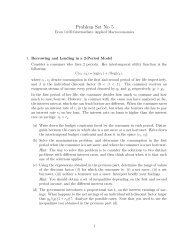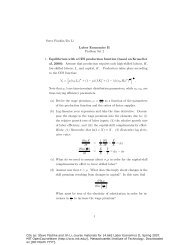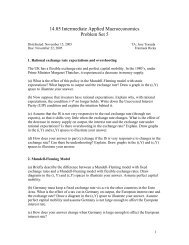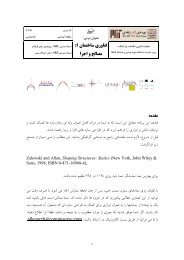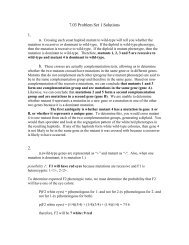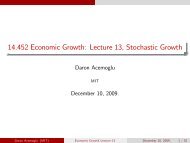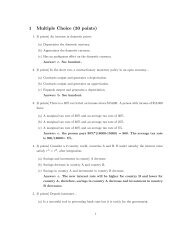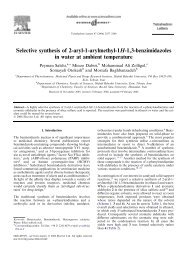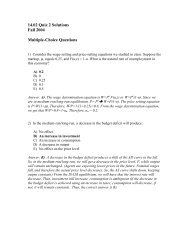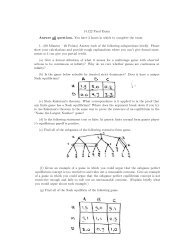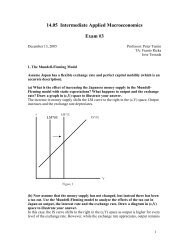Dramaturgy Wole Soyinka: b. 1934, Nigeria Kongi's Harvest ...
Dramaturgy Wole Soyinka: b. 1934, Nigeria Kongi's Harvest ...
Dramaturgy Wole Soyinka: b. 1934, Nigeria Kongi's Harvest ...
You also want an ePaper? Increase the reach of your titles
YUMPU automatically turns print PDFs into web optimized ePapers that Google loves.
<strong>Dramaturgy</strong><br />
‣ <strong>Wole</strong> <strong>Soyinka</strong>: b. <strong>1934</strong>, <strong>Nigeria</strong><br />
‣ Kongi’s <strong>Harvest</strong>: performed 1965, published 1967<br />
‣ <strong>Soyinka</strong> was arrested in 1967, held as a political prisoner until 1969<br />
‣ received the Nobel Prize in Literature in 1986<br />
‣ Personal Philosophies<br />
• “A tiger is not forever shouting about his tigritude”; a duiker antelope<br />
does not have to “prove his duikertude; you will know him by his<br />
elegant leap.”<br />
• anti-cultural parochialism (anti-negritude – negritude rejects white<br />
culture as a form of pollution)<br />
‣ <strong>Nigeria</strong><br />
• independent from UK in 1960<br />
• most populous country in Africa<br />
• Yoruba kingdoms of Ife and Oyo (AD 700-900, 1400), among many<br />
others in the region<br />
• <strong>Nigeria</strong>n Civil War: 1967-1970<br />
• caused by attempted secession of southeastern provinces as the<br />
republic of Biafra (spurred by series of military coups starting in<br />
1966)<br />
• starvation, claims of genocide.<br />
• eventually the Biafran forces fell, they sort of tried to work out a<br />
reconciliation<br />
• now: Federal Republic, 36 states, plus capital: each state has a House of<br />
Assembly and an elected governor, who appoints an executive council<br />
• government is still corrupt, full of bribery and in bed with the military<br />
Theatricality<br />
‣ verse vs. prose<br />
• what effect does switching between verse and prose have on the scene?<br />
What tone does each style evoke?<br />
‣ music<br />
• more songs…what’s their effect this time? How does <strong>Soyinka</strong> use them,<br />
and why?<br />
• Does having some songs in Yoruba and others in English change their<br />
effect? How does the language barrier shape the audience’s sense of this<br />
world?<br />
Politics<br />
‣ old vs. new<br />
• modern dictatorship vs. traditional hereditary system<br />
• are either really effective anymore? How does <strong>Soyinka</strong> play with our<br />
perceptions of both? Where does the younger generation come into<br />
play? Is there a sense of a system that would actually work, or just an<br />
expression of some that definitely don’t?
• who is more legitimate? How does Kongi try to cement his legitimacy?<br />
Is it just for show? How do you not just have the appearance of having<br />
power, but actually have it, be able to exercise it and have the people<br />
fully believe it and believe in it?<br />
‣ External implications about universal politics<br />
• “This play is not about Kongi, it is about Kongism. Therefore, while it<br />
has been suggested with some justification that there are some<br />
resemblances between the character of Kongi and that of ex-president<br />
Nkrumah … it must be emphasized that Kongism has never been<br />
dethroned in Black Africa. There are a thousand and more forms of<br />
Kongism – from the crude and blasphemous to the subtle and<br />
sanctimonious. A current variety may be described as neo-Peronism, the<br />
cult of plaster-cast sanctity. All roads lead in the same direction, and<br />
down this hill, striking sparks from careless skulls, Kongi rides again.<br />
Satire<br />
‣ how does <strong>Soyinka</strong> use satire, sarcasm to make a point, what kinds of<br />
conclusions are the audience left to draw about what exactly they’re seeing?<br />
‣ this often felt to me like a parody of politicians (what with the PR and spin<br />
doctoring, the ridiculous characterizations, etc.), but at times it distinctly<br />
leaves the world of comic satire and gets ugly – Kongi is not an especially<br />
gripping character, but during his speech at the harvest festival, he becomes<br />
this horrible unnatural creature foaming at the mouth – what effect do these<br />
tone changes have, or does this even really change the tone or is it just<br />
bringing out what’s underneath the surface of the entire play?<br />
Women<br />
‣ sex clearly has a larger role in the more traditional society (Donlola likes<br />
having his hair below the navel ruffled, etc.) – why? Are the new leaders so<br />
separate from the world of living, breathing people that they are rendered<br />
virtually asexual, sterile?<br />
‣ Segi seemed to me like a rather enigmatic character – why is she the only<br />
female we could really see? She clearly wields a great deal of power<br />
(primarily through her sexuality), but is that the only reason everyone has<br />
such strong reactions to her?



